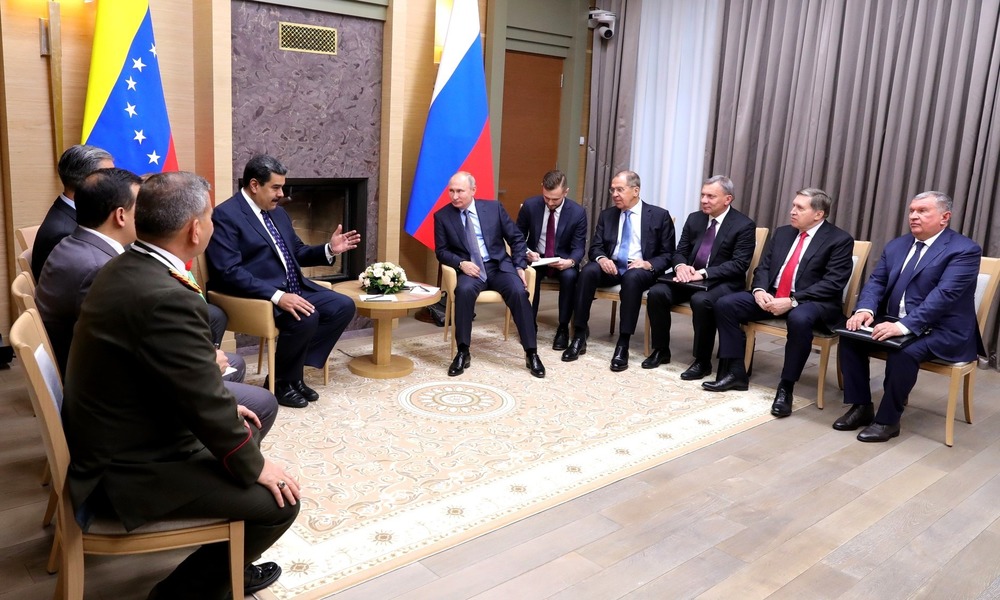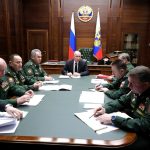RUSSIA MONITOR
Date: 21 December 2018
Venezuela Receives Financial Aid from Russia
Russia’s international policies have no longer taken into account any economic consideration. Instead, Moscow does not mind losing even billions of dollars in order to be able to further pursue its political and military goals, as evidenced by the Moscow-Caracas alliance. Yet the state, whose ex-president Hugo Chavez developed strong relations with the Kremlin, is currently facing the worst crisis in its history. Russia has long subsidized Venezuela’s regime, mainly by granting loans and trade agreements and securing investments in the crisis-wracked country. In return for its financial aid, it may thus urge Caracas to make concessions, both related to mining sector and military forces. Venezuela’s readiness to receive Russian aviation, fleet or permanent military facilities on its soil may further expose Caracas to the hostile actions of the United States. Nonetheless, Maduro has no other choice if he seeks to maintain authority in the country, a fact that is used by Russia whose authorities intend to prevent pro-American Venezuelan opposition from seizing power.

Venezuela is a typical petrostate whose oil dependence may be a blessing yet it is more often referred to as a curse, especially when its prices are dropping sharply all over the world. The state’s oil sales account for 98 percent of all export earnings, amounting to a half of Venezuela’s GDP. The extraction of raw materials has dramatically plummeted, reaching an all-time low in 2018. Venezuela’s GDP is therefore expected to decrease by double digits for the third straight consecutive year. Venezuela’s hyperinflation has already hit more than 50,000 percent as millions fled Venezuela, escaping rampant crime, violence, hyperinflation and constant shortages of basic necessities. The crisis in oil-rich Venezuela began in 2010 and was mostly induced by left-wing policies led by Hugo Chavez and his successors as well as low oil prices and U.S. sanctions. Nonetheless, the leftist government has no intention to introduce any changes while persecuting members of opposition parties. As a result, approximately 90 percent of the population live in poverty. Without any financial assistance from the outside, it will be difficult to maintain such a state of affairs for a long time. In this respect, Maduro may account on both China and Russia, with particular regard to the latter.
In 2017, Russia offered its support by restructuring Venezuela’s debt to Moscow following Maduro’s trip to Russia in October. This time, Venezuelan President traveled to the country specifically to ask Putin for help. Vladimir Putin hosted his Venezuelan counterpart Nicolas Maduro at the Novo-Ogaryovo state residence outside Moscow on December 5. During the talks, both leaders discussed Moscow’s financial aid for the crisis-wracked Caracas. Russian presidential aide Yury Ushakov said they will also hold talks on cooperation on oil and gas development. Ushakov declared Moscow will also express its support for peaceful dialogue in Venezuela, adding that the country’s “internal political problems must be settled through an open dialogue between political forces.” Furthermore, Russia expects Maduro to establish a dialogue with the state’s opposition, mostly due to image-related reasons.
The meeting appeared very successful. Maduro announced that both countries had inked investment deals worth more than 6 billion dollars. They will account for increasing oil (5 billion dollars) and mining production (1 billion dollars). Venezuelan leader explained that he signed a contract which guarantees “Russian investment to raise oil production ” to almost a million barrels” per day. The deals provide for developing the mining industry, primarily in gold. According to Maduro, a group of Russian experts and entrepreneurs will soon pay a visit to Venezuela in order to explore the possibilities of investments in diamond mining. The problem of a severe shortage of basic commodities should be at least partially resolved with a supply of 600,000 tons of Russian wheat, aiming to cover the country’s 2019 needs.
Naturally, Russia neither intends to offer aid for free nor it is about gaining shares in the oil or mining sectors (gold and diamonds). Not incidentally, Russia’s Defense Minister Sergei Shoigu held a meeting with his Venezuelan counterpart, General Vladimir Padrino Lopez, in Moscow. A few days later, Russian strategic bombers landed at an airport outside Caracas. There reemerged the issue of setting Russia’s military base in the Caribbean Sea.
All texts published by the Warsaw Institute Foundation may be disseminated on the condition that their origin is credited. Images may not be used without permission.














